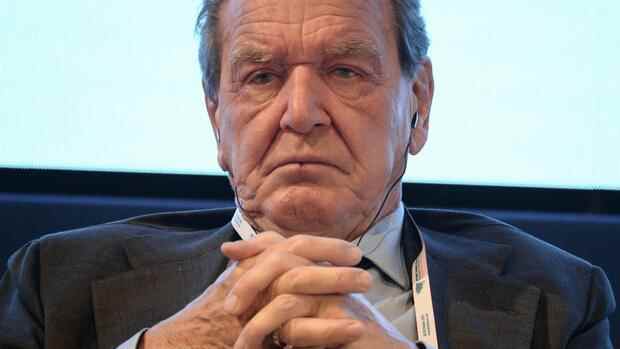“I will not give up my opportunities to talk to President Putin.”
(Photo: IMAGO/SNA)
Berlin Former Chancellor Gerhard Schröder wants to keep in touch with Russian President Vladimir Putin despite the Russian war of aggression against Ukraine. “I will not give up my opportunities to talk to President Putin,” Schröder told the Frankfurter Allgemeine Zeitung.
Against the background of the debate on arms deliveries to Ukraine, the former chancellor said: “Why do you focus on arms deliveries?” He does not believe in a military solution. “The only way to end the war is through diplomatic negotiations. The fate of the soldiers and the Ukrainian civilian population can only be alleviated through a diplomatic solution.”
Schröder has been close friends with Putin since he was chancellor (1998 to 2005). Around two weeks after the start of the Russian attack on Ukraine, the social democrat traveled to Moscow in March to speak with the Kremlin chief. “As far as I understood him in my conversation, he has an interest in a negotiated solution,” said the SPD politician. “What such a solution looks like can only be clarified in a negotiation.”
The “FAZ” report said that Schröder had made it clear in an interview with the newspaper that, in his opinion, negotiations had failed so far because of Ukraine. The newspaper also reported details of Schröder’s trip to Moscow – and also mentioned how peace could come about, which Schröder had presented to Putin.
Top jobs of the day
Find the best jobs now and
be notified by email.
The FDP Vice-Chairman Wolfgang Kubicki reacted critically to Schröder’s recent statements: “Basically, of course, it’s always better to keep in touch with the leaders of authoritarian states and nobody can prevent the ex-Chancellor from doing this,” Kubicki told the newspapers the Funke media group. “But anyone who thinks that Germany has a diplomatic obligation to end the war in Ukraine is distorting the facts. In any case, this is not a serious contribution that will help end the war.”
Also read on the topic:
Kubicki continued: “I don’t care at all whether Gerhard Schröder believes that a negotiated solution can be worked out with Vladimir Putin. I think that’s pretty unrealistic now.”
The former chancellor has been criticized for years for his commitment to Russian state-owned companies. After the Russian attack on Ukraine, the pressure on him continued to mount, the SPD leadership distanced itself, and there have been several applications for expulsion from the party. Schröder finally announced in May that he was leaving the board of directors of the Russian energy giant Rosneft and turned down a nomination for a board position at Gazprom.
The former chancellor said of SPD leader Lars Klingbeil, who had declared his friendship with Schröder over, “That is disappointing. He probably thinks he owes the office that.”
More: Union demands tougher action against Gerhard Schröder
